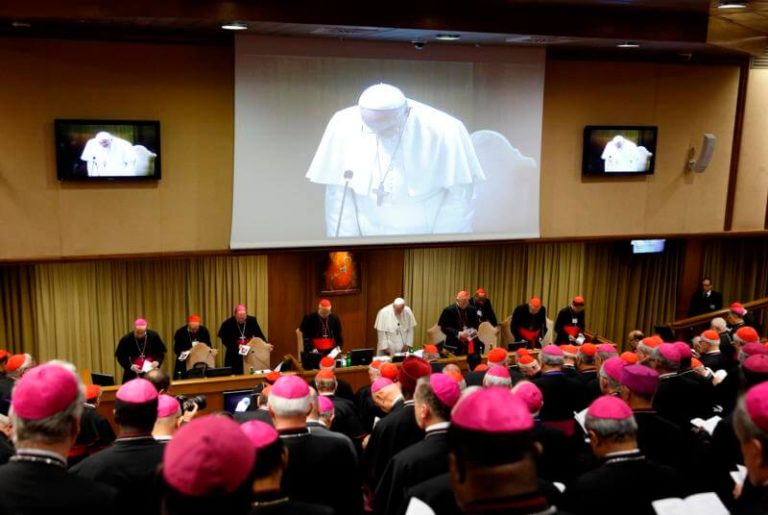In the wake of the World Synod of Bishops on the Family, no one knows what Pope Francis may decide about the best ways for the church to reach out to families in the modern world.
In repeatedly emphasizing God’s mercy as the central duty of the church, however, the pope is already affecting the way church leaders and people in the pews are thinking about marriage and family life.
“What the church teaches about marriage and family doesn’t change,” said Father Gilbert Seitz, judicial vicar of the Metropolitan Tribunal, which handles annulments in the Archdiocese of Baltimore. “Perhaps what has to change is the heart of the person presenting the message – to be more compassionate, more understanding and more patient.”
Father Seitz suggested that the pope is “trying to challenge everyone who presents the Gospel, doctrine and teachings to experience conversion so that their heart is in a different place and they are more Christ-like.”
The three-week synod on the family concluded Oct. 24 with the approval of a report encouraging Catholics to live and understand church teachings more fully while also asking church leaders to accompany those who may be living in situations outside the church’s framework for the family. It’s a challenging combination – a call to maintain doctrinal fidelity while also embracing a sense of pastoral outreach.
“As frustratingly vague as it might sound, I think the pope is trying to show that mercy and justice are not incompatible,” said Dr. Paige Hochschild, a theology professor at Mount St. Mary’s University in Emmitsburg. “Rather than receiving the church’s teachings on marriage as a judgment or a condemnation, he wants people to see that they are life-giving, that they can lead to reconciliation.”
Hochschild, a parishioner of St. Anthony Shrine in Emmitsburg, speculated that emphasizing the sacrament of reconciliation in parish life is one possible practical outcome of the synod.
“I’ve seen that at my parish,” she said, “and it’s been a source of great renewal and deepening of faith.”
Real reform
Pope Francis’ decision to make annulments more accessible through reforms such as the removal of automatic appeals, Father Seitz said, was a direct result of discussions in the working document of the synod of bishops. Annulment reforms are set to go into effect Dec. 8 (see story here).
“There seems to be a renewed zeal among pastors to provide something to help folks find their way back to the sacraments,” Father Seitz said. “They are looking to us as the tribunal to be the instrument that enables folks to do that – to be a model of mercy that the Holy Father is talking about.”
Deacon Frederick C. Bauerschmidt, a theology professor at Loyola University Maryland in Baltimore whose diaconal assignment is Corpus Christi in Baltimore, said a fruit of the synod may be more rigorous marriage preparation within the church. Some have already proposed preparation akin to the RCIA program, he said.
The way the synod was conducted might encourage more open dialogue on difficult topics, the deacon added.People may look to the language in which the synod was conducted, he said, and think about the implications for parish life.
“The bishops felt free to speak their mind and even disagree with each other, which hasn’t always been the case at previous synods,” Deacon Bauerschmidt said.
Dr. John Grabowski, a theology professor at The Catholic University of America in Washington who was appointed to be an expert at the synod, said there’s a need for a greater understanding of marriage as a sacrament, a reality addressed at the synod. He and his wife, Claire, parishioners of St. Ignatius in Ijamsville, serve on the Pontifical Council for the Family in Rome.
“The (synod’s) focus was on how families can be active participants in the new evangelization,” he said.
Grabowski noted that the final report of the synod carries no teaching weight. It’s up to the pope to decide what to take from the report in any document he may produce.
The Grabowskis are organizing a 12-week program at their parish to help married couples deepen their relationships and their vocation.
Summing up reaction to the synod and the pope’s recent visit to the United States, Capuchin Franciscan Father William Graham, adjutant judicial vicar of the tribunal, said he senses excitement among priests for the mission of mercy modeled by the pope.
“There’s a principle in canon law,” he said. “It’s the very last canon of the code: the salvation of souls is the highest law.”
John Grabowski will give a presentation on the Synod on the Family Dec. 7 at 7:30 p.m. at St. Ignatius in Ijamsville.


